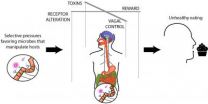(Press-News.org) Today, many ecological and evolutionary studies depend on a wide range of molecular tools to infer phylogenetic relationships, uncover population structure within species, and track quantitative traits. Agricultural studies use these same tools to improve crop yield and increase resistance to pests and disease.
However, many of these methods—such as amplified fragment length polymorphisms (AFLP), inter-simple sequence repeats (ISSR), and random amplified polymorphic DNA (RAPD)—have technical limitations. These include issues of reproducibility, ambiguity in determining homology, and significant demands on both cost and time for researchers.
Sequence-related amplified polymorphism (SRAP) markers show promise as an alternative to traditional markers as they have proved to be highly variable and less technically demanding to obtain and use. This recently developed dominant marker technique produces genome-wide fragments and has been used primarily in studies aimed at crop development. Previous studies have utilized this method to identify pathogen-resistant markers and better understand the genetic basis of fruit and flower form and structure, as well as flowering and fruiting times.
In a new study in a recent issue of Applications in Plant Sciences, researchers at Ohio State University have made a case for the use of these markers across a broad range of research fields including plant systematics, biogeography, conservation, and ecology. "These markers exhibit variation useful for uncovering genetic structure at a variety of taxonomic levels, constructing linkage maps, and have proven valuable for the improvement of agronomic crops," explains Daniel Robarts, lead author of the study.
Robarts and colleagues surveyed hundreds of published peer-reviewed papers and presented a number of case studies to further demonstrate the applicability of these markers in plant biology. "We found SRAP markers to be comparable to AFLP markers in terms of levels of variation, but requiring significantly less technical effort and cost," says Robarts. "Furthermore, these markers provide highly reproducible results and no prior genomic information is necessary, making them ideal for non-model systems."
The study also suggests these markers will be useful when paired with next-generation sequencing technologies. Because SRAP loci are derived from a single forward primer and numerous reverse primers, it would be possible to adapt the technique to enrich genomic libraries for next-generation sequencing, providing an efficient protocol for discovery of polymorphisms.
"Although these markers have been primarily used for improvement of crop plants, we are excited about the potential of the SRAP marker technique as a more broadly applicable method in plant sciences. We expect these markers to be especially useful for population-level studies, but our results suggest they will likely provide a useful tool at higher taxonomic levels as well," says Robarts.
INFORMATION:
Daniel W. H. Robarts and Andrea D. Wolfe. 2014. Sequence-related amplified polymorphism (SRAP) markers: A potential resource for studies in plant molecular biology. Applications in Plant Sciences 2(7): 1400017. doi:10.3732/apps.1400017.
Applications in Plant Sciences (APPS) is a monthly, peer-reviewed, open access journal focusing on new tools, technologies, and protocols in all areas of the plant sciences. It is published by the Botanical Society of America, a nonprofit membership society with a mission to promote botany, the field of basic science dealing with the study and inquiry into the form, function, development, diversity, reproduction, evolution, and uses of plants and their interactions within the biosphere. APPS is available as part of BioOne's Open Access collection.
For further information, please contact the APPS staff at apps@botany.org.
Utility of sequence-related amplified polymorphism (SRAP) markers
Recent study illustrates the potential of SRAP markers in plant biology studies
2014-08-15
ELSE PRESS RELEASES FROM THIS DATE:
Depression often untreated in Parkinson's disease
2014-08-15
Depression is known to be a common symptom of Parkinson's disease, but remains untreated for many patients, according to a new study by Northwestern Medicine investigators in collaboration with the National Parkinson's Foundation (NPF).
In fact, depression is the most prevalent non-motor symptom of Parkinson's, a chronic neurodegenerative disorder typically associated with movement dysfunction.
"We confirmed suspicion that depression is a very common symptom in Parkinson's disease. Nearly a quarter of the people in the study reported symptoms consistent with depression," ...
Scientists discover interstellar stardust
2014-08-15
We may joke about looking for a needle in a haystack, but that's nothing compared to searching for stardust in a foil! A new paper published in Science reveals that such work has led to the discovery of seven dust particles that are not only out of this world, they're out of this solar system.
The Stardust Interstellar Dust Collector was launched in 1999 in an effort to collect contemporary interstellar dust—dust that has travelled to our solar system from another. The Collector returned in 2006; since then scientists have been combing through blue aerogel and aluminum ...
Credit allocation among researchers determined by new algorithm
2014-08-15
A new algorithm developed at Northeastern's Center for Complex Network Research helps sheds light on how to properly allocate credit.
The research was published this month in Proceedings of the National Academy of Sciences in a paper co-authored by Hua-Wei Shen, a visiting scholar at Northeastern and associate professor at the Institute of Computing Technology at the Chinese Academy of Sciences, and Albert-László Barabási, the Robert Gray Dodge Professor of Network Science and a Distinguished University Professor at Northeastern.
Using ...
New X-ray imaging developed by scientists
2014-08-15
Scientists have developed an x-ray imaging system that enables researchers to see 'live' how effective treatments are for cystic fibrosis.
Published in the American Journal of Respiratory and Critical Care Medicine, the imaging method allows researchers to monitor the effectiveness of a treatment for the life-threatening genetic disorder.
Cystic fibrosis affects many of the body's systems, but most severely the lungs, and currently it can take several months to measure how effective treatment is for the early-fatal lung disease.
Dr Kaye Morgan, lead researcher on ...
'Science' features PRB, WSU, DMC advances in preterm birth
2014-08-15
DETROIT – The Aug. 15 edition of the prestigious journal Science features a major article about the most important problem in obstetrics: preterm labor. The article, "Preterm labor: one syndrome, many causes," delivers a powerful message: preterm birth is not one condition, but many, and provides a framework for meeting this challenge.
"There are 15 million preterm babies born annually, and the condition affects 5 percent to 15 percent of all pregnancies, with the highest rates in North America and Africa. Prematurity is the leading cause of infant death up to age 1and ...
Charges for blood tests vary across California hospitals
2014-08-15
New UC San Francisco research shows significant price differences for ten common blood tests in California hospitals, with some patients charged as little as $10 for one test while others were charged $10,169 for the identical test.
The analysis of charges at more than 150 California hospitals looked at blood tests that are often required of patients, such as lipid panel, basic metabolic panel, and complete blood cell count with differential white cell count.
Hospital ownership and teaching status help explain a portion of the variation – prices generally were lower ...
Do gut bacteria rule our minds?
2014-08-15
It sounds like science fiction, but it seems that bacteria within us — which outnumber our own cells about 100-fold — may very well be affecting both our cravings and moods to get us to eat what they want, and often are driving us toward obesity.
In an article published this week in the journal BioEssays, researchers from UC San Francisco, Arizona State University and University of New Mexico concluded from a review of the recent scientific literature that microbes influence human eating behavior and dietary choices to favor consumption of the particular nutrients they ...
Stroke researchers link ability to self-administer medication with memory loss
2014-08-15
West Orange, NJ. August 15, 2014. Kessler stroke researchers and colleagues have identified an association between over-optimistic estimation of one's own ability to take medications accurately, and memory loss among stroke survivors. Results indicate that assessing patients for their ability to estimate medication skills accurately may predict memory disorder. The article, "Stroke survivors over-estimate their medication self-administration ability (MSA), predicting memory loss," was epublished ahead of print on May 28 by Brain Injury (doi:10.3109/02699052.2014.915984). ...
Visual exposure predicts infants' ability to follow another's gaze
2014-08-15
Following another person's gaze can reveal a wealth of information critical to social interactions and also to safety. Gaze following typically emerges in infancy, and new research looking at preterm infants suggests that it's visual experience, not maturational age, that underlies this critical ability.
The research is published in Psychological Science, a journal of the Association for Psychological Science.
"To the best of our knowledge, this is the first study showing that some aspects of the early development of social cognition is influenced by experience, even ...
NASA satellite spots a weakening Karina, now a tropical storm
2014-08-15
NASA's Terra satellite passed over Hurricane Karina before it weakened to a tropical storm early on August 15 and imagery showed the vertical wind shear was already taking its toll.
NASA's Terra satellite passed over Karina on August 14 at 2:40 p.m. EDT when it was still clinging to hurricane status and noticed that wind shear was already having an effect on the storm's structure. The Moderate Resolution Imaging Spectroradiometer or MODIS instrument captured an image that showed that the bulk of Karina's clouds were being pushed to the western side of the storm. That ...
LAST 30 PRESS RELEASES:
New knowledge on heritability paves the way for better treatment of people with chronic inflammatory bowel disease
Under the Lens: Microbiologists Nicola Holden and Gil Domingue weigh in on the raw milk debate
Science reveals why you can’t resist a snack – even when you’re full
Kidney cancer study finds belzutifan plus pembrolizumab post-surgery helps patients at high risk for relapse stay cancer-free longer
Alkali cation effects in electrochemical carbon dioxide reduction
Test platforms for charging wireless cars now fit on a bench
$3 million NIH grant funds national study of Medicare Advantage’s benefit expansion into social supports
Amplified Sciences achieves CAP accreditation for cutting-edge diagnostic lab
Fred Hutch announces 12 recipients of the annual Harold M. Weintraub Graduate Student Award
Native forest litter helps rebuild soil life in post-mining landscapes
Mountain soils in arid regions may emit more greenhouse gas as climate shifts, new study finds
Pairing biochar with other soil amendments could unlock stronger gains in soil health
Why do we get a skip in our step when we’re happy? Thank dopamine
UC Irvine scientists uncover cellular mechanism behind muscle repair
Platform to map living brain noninvasively takes next big step
Stress-testing the Cascadia Subduction Zone reveals variability that could impact how earthquakes spread
We may be underestimating the true carbon cost of northern wildfires
Blood test predicts which bladder cancer patients may safely skip surgery
Kennesaw State's Vijay Anand honored as National Academy of Inventors Senior Member
Recovery from whaling reveals the role of age in Humpback reproduction
Can the canny tick help prevent disease like MS and cancer?
Newcomer children show lower rates of emergency department use for non‑urgent conditions, study finds
Cognitive and neuropsychiatric function in former American football players
From trash to climate tech: rubber gloves find new life as carbon capturers materials
A step towards needed treatments for hantaviruses in new molecular map
Boys are more motivated, while girls are more compassionate?
Study identifies opposing roles for IL6 and IL6R in long-term mortality
AI accurately spots medical disorder from privacy-conscious hand images
Transient Pauli blocking for broadband ultrafast optical switching
Political polarization can spur CO2 emissions, stymie climate action
[Press-News.org] Utility of sequence-related amplified polymorphism (SRAP) markersRecent study illustrates the potential of SRAP markers in plant biology studies



